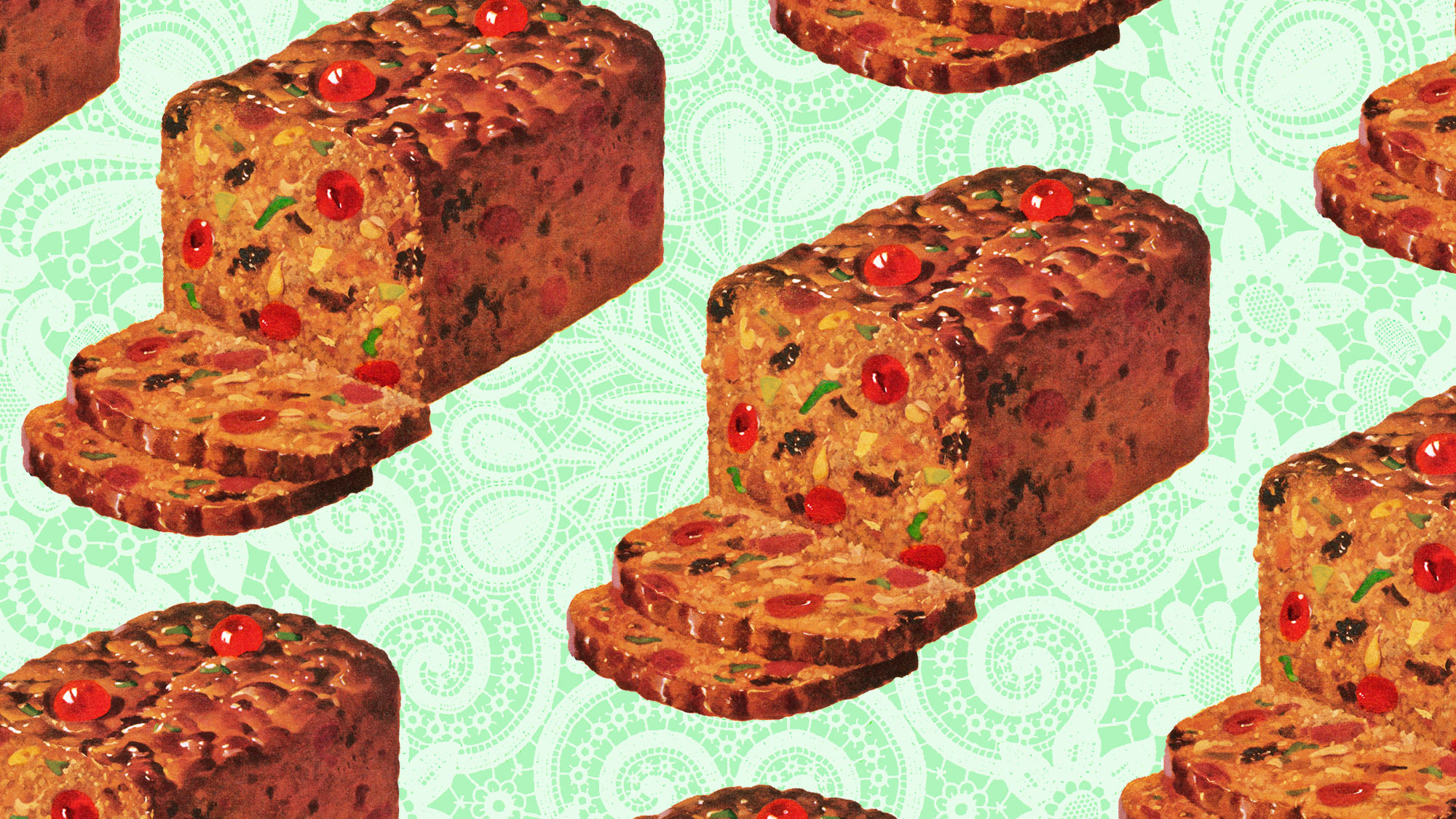 I first encountered fruitcake, outside of the context of late-night jokes, as a teenager. I’d gotten hooked on the English food writer Nigella Lawson’s glamorously hedonistic early-2000s cooking show Nigella Bites, and my parents had bought me Lawson’s second cookbook, the archly titled How to Be a Domestic Goddess, as a present. The cookbook presented fruitcake — or in its parlance, “Christmas cake” — as a fait accompli, something that of course I was going to take on come December.
I first encountered fruitcake, outside of the context of late-night jokes, as a teenager. I’d gotten hooked on the English food writer Nigella Lawson’s glamorously hedonistic early-2000s cooking show Nigella Bites, and my parents had bought me Lawson’s second cookbook, the archly titled How to Be a Domestic Goddess, as a present. The cookbook presented fruitcake — or in its parlance, “Christmas cake” — as a fait accompli, something that of course I was going to take on come December.
Lawson, known for her unfussy approach to decadent desserts, writes in the intro for her standard recipe that it can be interpreted as more of a “blueprint” for any number of fruitcake variations. Hers includes regular raisins, golden raisins, currants, candied cherries, glazed citrus peel, and a healthy glug of brandy.
The concept intrigued me for a variety of reasons. For one thing, it was very British, which to my teen mind was the same as being interesting. For another, fruitcake was a capital-P Project, requiring hard-to-find ingredients and lots of advance planning. Most recipes will have you soak your fruit and nuts in booze at least overnight, and potentially much longer, before you mix the batter and bake it. And then, after you bake it, the loaf is meant to sit and mature for weeks or months, as you occasionally “feed” it more liquor to keep it moist, “like some kind of Christmas Tamagotchi,” as one of my colleagues observed.
Finally, fruitcake’s old-fashionedness piqued my sense of nostalgia for a simpler, more wholesome time. What was fruitcake but a crude compound of dried fruit, nuts, and liquor, three of the most luxurious ingredients available to a person living in Europe or North America before the dawn of industrial agriculture?
To that end, as I baked my first fruitcake circa 2004, I felt that I was traveling back in time to a premodern era when the greatest treat the average soul could hope to put in their mouth was a hard-earned, annual bite of fruitcake. I envied that imagined person’s innocent palate, unspoiled by modern holiday indulgences like snowball cookies, peppermint bark, and gingerbread lattes. This pleasantly puritan feeling persisted as I made many more fruitcakes in the years that followed, even branching out to fruitcake cousins like plum pudding, mince pies, and stollen. (My family’s bewilderment and concern at my enthusiasm for medieval baked goods gradually softened into something I would describe as fond acceptance.)
But I regret to say that my fruitcake nostalgia does not stand up to much scrutiny. The only reason fruitcake’s ascetic vibe appealed to me in the first place was that my life did not actually involve any deprivation — as a child of an upper-middle-class, white, suburban family, all of my material wants and needs were met. And the ingredients for my beloved fruitcakes weren’t exactly straight from the farm — they contained plenty of industrially produced butter and sugar and flour, and those pounds upon pounds of desiccated fruit came conveniently packaged in the baking aisle at the grocery store.
Fruitcake was basically rustic cosplay for me, a superficial gesture at a traditional lifestyle that I had no genuine interest in fully inhabiting — kind of like how I feel when I wear old clothes handed down to me by my parents, buy milk in reusable glass jugs, or use cloth bags in the bulk aisle instead of disposable plastic ones.
But nostalgia about fruitcake is not, for most people who experience it, a means of processing class guilt. Fruitcake, to be sure, isn’t the exclusive province of white Christmases. In Caribbean nations, for example, where fruitcake outlasted British rule, the traditional holiday delicacy known as black cake is just about slowing down and investing time and resources in a seasonal treat for loved ones.
Taymer Mason, author of the cookbook Caribbean Vegan and co-proprietor of the U.K.-based vegan food line Island Love Gourmet, told me in an email that when she was growing up in Barbados in the 1980s, “the scent of cakes pervaded the atmosphere” during the holidays. That started to fade out in her teens, when “life got busier” and more bakeries and stores started offering black cakes as fewer home cooks found time to make the investment of soaking fruit in liquor for a whole year, as per tradition.
But homemade black cake may be making a resurgence. “I see baking making a comeback and younger bakers are offering black cake again,” Mason said, even reviving old family recipes to do so. Island Love Gourmet’s vegan Christmas black cake, for example, is based on Mason’s husband’s aunt’s recipe.
Even though I no longer see fruitcake as a portal back to a simpler era, I still think that homemade fruitcake is a worthwhile yearly endeavor, but for new reasons. At the risk of once again burdening an innocent Christmas dessert with too much meaning, I think fruitcake’s long maturation period is a useful psychological exercise. Snap-your-fingers convenience, at least in its contemporary form, frequently comes at the cost of both the environment and human rights.
Delayed gratification could be a key value of an equitably decarbonized future, when climate-conscious policy changes might be incompatible with overnight shipping, twelve-lane freeways, a hamburger delivered to your office every day for lunch. But taking things slower doesn’t have to be such a sacrifice. Homemade fruitcake is proof that waiting a while for something you want can be not only tolerable, but enjoyable.








